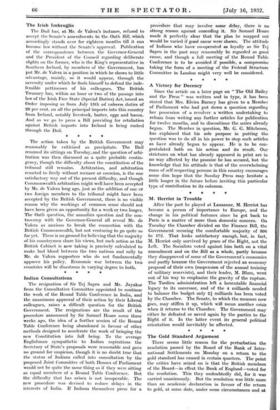Indian Consultations The resignation of Sir Tej Sapru and Mr.
Jayakar from the Consultative Committee appointed to continue the work of the Round Table Conference in India, and the unanimous approval of their action by their Liberal colleagues, raises a difficult question for the British Government. The resignations are the result of the procedure announced by Sir Samuel Hoare some three weeks ago, the idea of a further session of the Round Table Conference being abandoned in favour of other methods designed to accelerate the work of bringing the new Constitution into full being. To the average Englishman sympathetic to Indian aspirations the Secretary of State's proposals were reasonable and gave no ground for suspicion, though it is no doubt true that the status of Indians called into consultation by the proposed Joint Committee of both Houses of Parliament would not be quite the same thing as if they were sitting as equal members of a Round Table Conference. But the difficulty that has arisen is not insuperable. The new procedure was devised to reduce delays in the interests of India. If Indians themselves press for a procedure that may involve some delay, there is no strong reason against conceding it. Sir Samuel Hoare made it perfectly clear that the plan he mapped out would be varied if good cause were shown. The attitude of Indians who have co-operated as loyally as Sir Tej Sapru in the past may reasonably be regarded as good cause, and though a full meeting of the Round Table Conference is to be avoided if possible, a compromise taking the form of a meeting of the Federal Structure Committee in London might very well be considered.
* * *


































 Previous page
Previous page